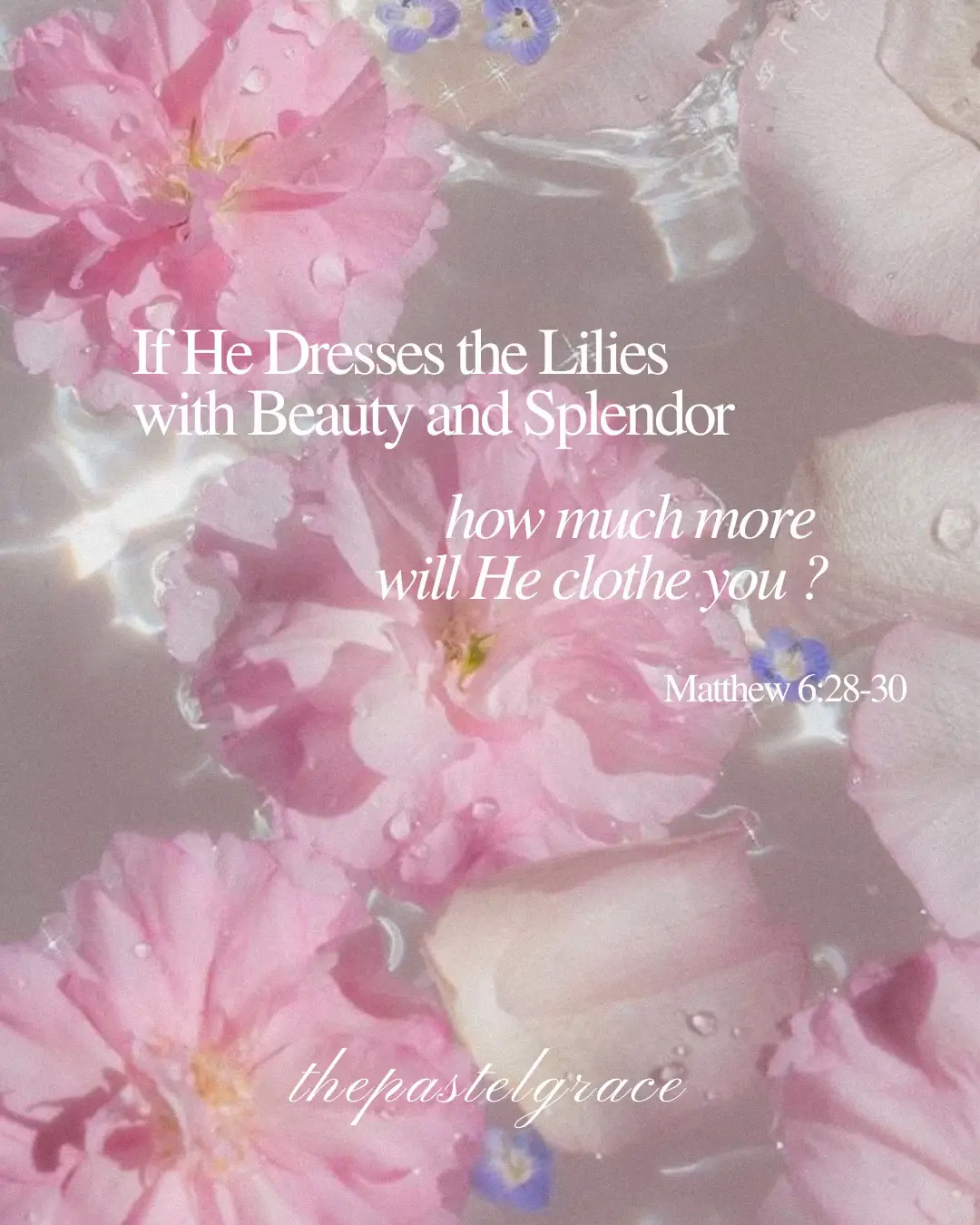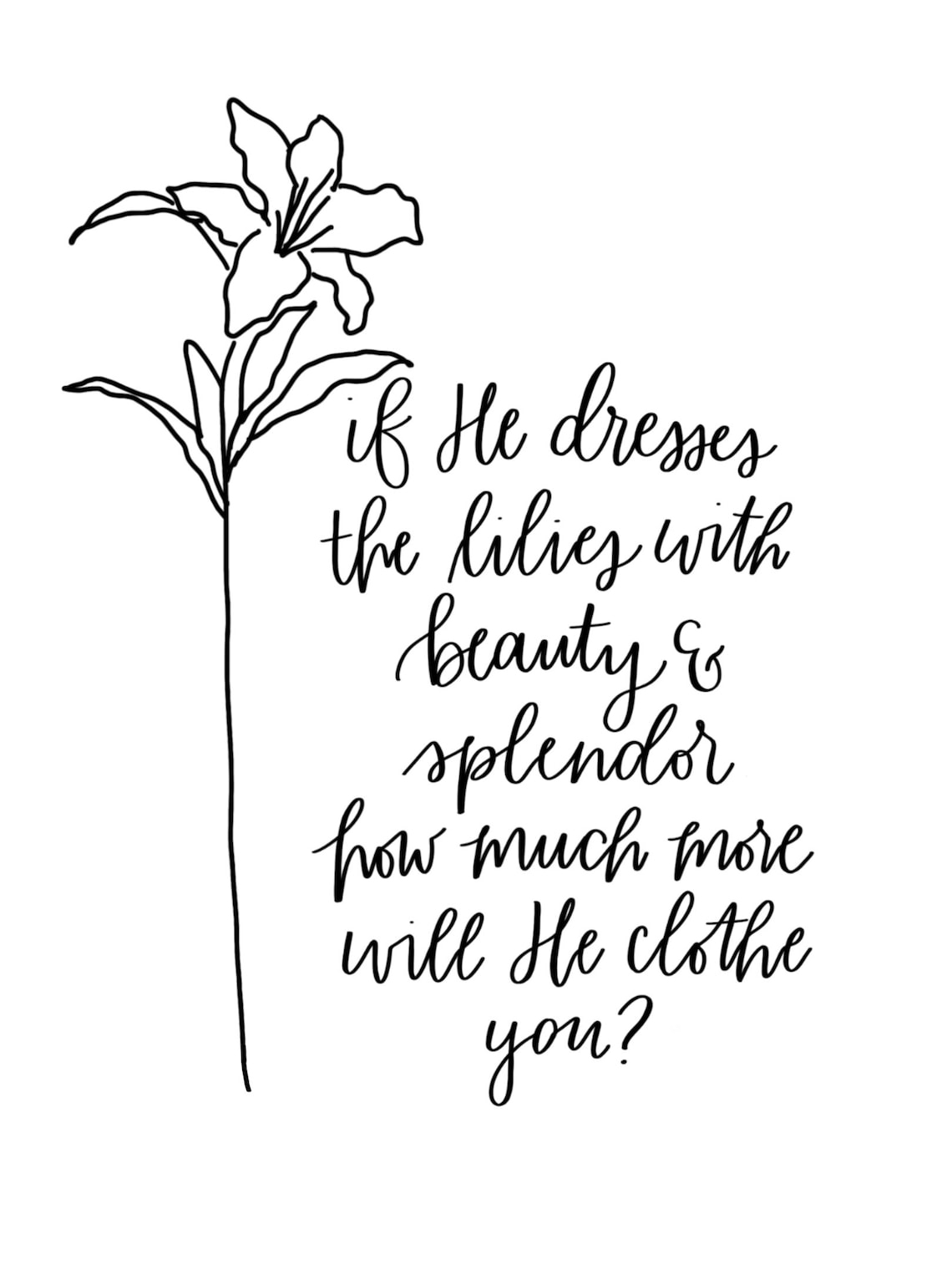Does the beauty and provision of nature hold a profound message for us? The simple elegance of a wildflower, untouched by labor, surpasses the grandeur of even the most powerful earthly rulers, revealing a deeper truth about faith and provision.
The search queries, repeatedly failing to yield results for If he dresses the lilies with beauty and splendor, underscore a crucial point: this isn't about a simple formula for earthly gain. Instead, it's a call to recognize a divine principle woven into the fabric of existence itself. The passage, drawing its power from the natural world, invites us to consider the lilies of the field, their effortless beauty a stark contrast to the anxieties that plague our lives. They neither toil nor spin, yet they are clothed in splendor far exceeding the finest garments. This observation, a cornerstone of spiritual teaching, directs our attention towards the source of this provision.
This concept, deeply rooted in the teachings of religious texts, contrasts human efforts with divine grace. We are encouraged to observe the natural world, specifically the lilies of the field. These flowers, which neither work nor worry, are presented as examples of beauty and provision. The very fact that they flourish without toil is used as a powerful argument. This approach presents a radical perspective to understand the source of provision for human being.
| Aspect | Details |
|---|---|
| Core Message | The unwavering love and provision of a higher power, exemplified by the beauty of nature. |
| Key Textual Reference | Matthew 6:28-30 (and parallel passages in Luke) |
| Central Metaphor | The lilies of the field and their inherent beauty and care, despite not working. |
| Contrast | The contrast between the anxieties of human life and the effortless provision demonstrated in nature. |
| Historical Context | Jesus' teachings within a context of societal anxieties about basic needs. |
| Thematic Interpretation | Encouragement to trust in a higher power, and surrender anxieties regarding basic needs. |
| Call to Action | To release our anxieties, trust in a divine plan, and find peace in the knowledge of unwavering care. |
| Associated Value | The verse is more about faith and trust, not materialistic prosperity. |
| Relevance | The verse is related to everyday life, we can draw inspiration from the natural world and embrace a life of reduced anxiety. |
| Key figure | Jesus Christ |
| Location | Galilee |
| Historical background | The teachings originated around 30 AD |
| Social impact | These teachings have influenced people across various social, religious and cultural divides. |
| Philosophical impact | The teachings influence the idea of living a life free of anxiety and full of trust |
| Other associated figures | Solomon |
| Reference Link | Bible Gateway |
The question isn't merely about the lilies themselves, but about the principle they embody. They are a symbol of a care that extends beyond human comprehension, a promise that resonates through the ages. The essence lies in the question posed, Why worry about your clothing? (Matthew 6:28). Its a question that cuts to the heart of human nature, our propensity for anxiety, our constant striving. It challenges us to re-evaluate our priorities, to consider where we place our trust.
Consider the lilies, they stand as a potent example. "They toil not, neither do they spin," (Matthew 6:28). They exist in a state of effortless grace, a state we, as humans, often find difficult to emulate. The passage presents an intriguing juxtaposition: the natural world, characterized by its inherent provision, contrasted with human anxieties. This juxtaposition serves a particular purpose. It highlights the contrast between a life free from worry and the common human experience, inviting us to embrace a different perspective.
The passage doesn't stop at a mere observation of nature; it makes a direct comparison. Even Solomon, in all his glory, was not arrayed like one of these. His splendor, the culmination of wealth and power, pales in comparison to the simple beauty of a wildflower. "And yet I say unto you, that even Solomon in all his glory was not arrayed like one of these," (Matthew 6:29). This comparison is striking; it effectively subverts the values often prioritized by society. It suggests that true beauty and value are found not in material possessions, but in something far deeper, in the effortless grace of the natural world, a gift freely given.
The narrative progresses further, emphasizing the extent of divine care. If God so clothes the grass of the field, which is here today and tomorrow is thrown into the oven, shall he not much more clothe you, O ye of little faith? (Matthew 6:30). This is not merely a statement, its a challenge. It challenges the listener to reflect on the degree of Gods care, and question where their faith lies. The logic is compelling: if the ephemeral beauty of the grass is so meticulously provided for, how much more will the needs of those held dear be met?
This is not an encouragement of idleness. It is not an endorsement of apathy or irresponsibility. It's an invitation to adjust our focus, to place our trust in a higher power, and to find freedom from the burden of excessive worry. The wildflowers teach us a valuable lesson: the beauty and provision are intrinsic to life and are given without our conscious effort. The divine is present even in the most simple elements of the world. We are called to look at our lives, to understand where our priorities lie, to question our anxieties, and to align ourselves with the deeper truth that lies beneath.
The If he dresses the lilies with beauty and splendor verse isn't simply about avoiding anxieties; it's a call to action. It's an invitation to embrace a life of trust, where worries are replaced by faith. It is a reminder of the inherent goodness, beauty, and provision in the world, and of the unwavering care extended to all of creation. It serves as a powerful reminder to trust the divine plan, and to live each day with a sense of peace and confidence.
The message embedded in the wildflowers resonates with all who seek meaning and purpose. It invites the reader to question the source of their worries and to consider whether their concerns align with a deeper truth. This verse is an invitation to reassess values, to seek a life of purpose, and to find serenity by embracing a faith that promises provision.
The teachings encourage a shift in perspective, prompting a redirection of focus away from material anxieties and towards a source of unwavering support. The verse suggests that God cares for us more than the grass of the field. This invites us to cultivate a mindset of trust, to let go of anxieties and worries, and to embrace the divine care that is always present. It's a recognition that true wealth lies not in material possessions but in the peace that comes from faith.
The story of the lilies is not just a story, it is a call to action. It is a call to re-evaluate priorities. It encourages us to embrace faith over fear, to trust in provision, and to find solace in the unwavering care that surrounds us. The wildflowers serve as an invitation to transform our outlook, to find peace in trust, and to recognize that true beauty and provision are always available, awaiting our recognition.
The constant failure to find results for the verse acts as a reminder. It serves as a powerful testament to its inherent meaning, a message that transcends the simple pursuit of material gain. The story is about the inherent provision and beauty that lie at the heart of existence. It challenges us to recognize the difference between human anxieties and divine care. The wildflowers are a persistent call to faith and trust.



